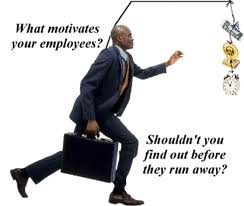It’s Friday afternoon and one of your employees asks for a private meeting. The conversation ends with an unexpected resignation from someone you’ve grown to rely on. Perhaps the person was reliable, knowledgeable, or working on a critical project. If this has ever happened to you, you’re not alone. Although you didn’t see it coming and you hate to lose the person, abrupt employee departures can be especially hard for managers.
Intrinsic motivation means that an individual’s motivational stimuli comes from within and can include acceptance, appreciation, curiosity, independence, social contact, and social status. In contrast, extrinsic motivation is controlled by outside forces such as money, benefits package, bonuses, and employee of the month.
When employees feel that their work is not appreciated, their morale can quickly deteriorate. This can ultimately lead to reduced performance and productivity and can cause some employees to look for employment elsewhere. Keeping employees engaged and motivated is essential. Verbal recognition and rewarding performance, even for small contributions, is important. If employees feel valued and appreciated for their achievements, they make a difference to you and your company.
 There are many ways an employer can show recognition and appreciation to their employees. Shouldn’t you take the time to find out before they end up leaving? Sometimes all it takes is a thank you or a pat on the back or a small luncheon or perhaps some schedule flexibility. If a client or someone from another department sends you an email sharing an amazing experience they had with one of your employees, then share it. Showing appreciation could even be as simple as asking employees for their input or opinions about something important on a project. The possibilities are endless but one thing is for sure. Showing appreciation for each employee will improve staff retention.
There are many ways an employer can show recognition and appreciation to their employees. Shouldn’t you take the time to find out before they end up leaving? Sometimes all it takes is a thank you or a pat on the back or a small luncheon or perhaps some schedule flexibility. If a client or someone from another department sends you an email sharing an amazing experience they had with one of your employees, then share it. Showing appreciation could even be as simple as asking employees for their input or opinions about something important on a project. The possibilities are endless but one thing is for sure. Showing appreciation for each employee will improve staff retention.
All employees need positive reinforcement. It is important that you do not take employees for granted especially in an already overworked and understaffed workforce.
Even if managers do all of these things effectively, some people will still leave to pursue other opportunities. This is particularly true for top performers.
Retaining employees takes a lot of hard work, but so does replacing them. Research has shown that retaining staff is not related to extrinsic motivation and compensation—it’s about intrinsic factors such as appreciation, recognition, acceptance, social status, communication, and teamwork.
